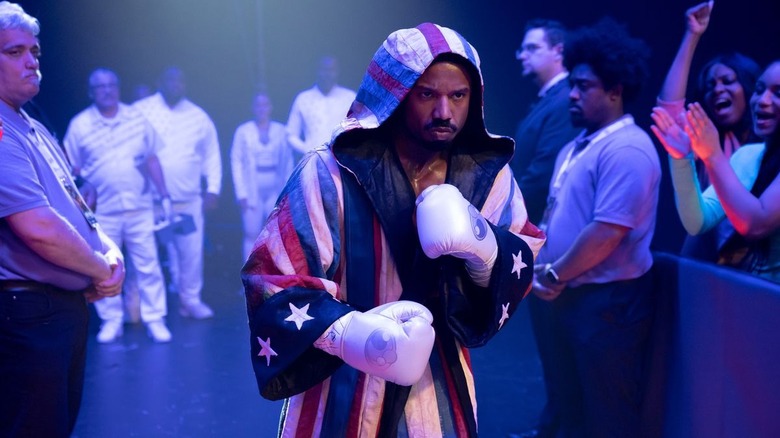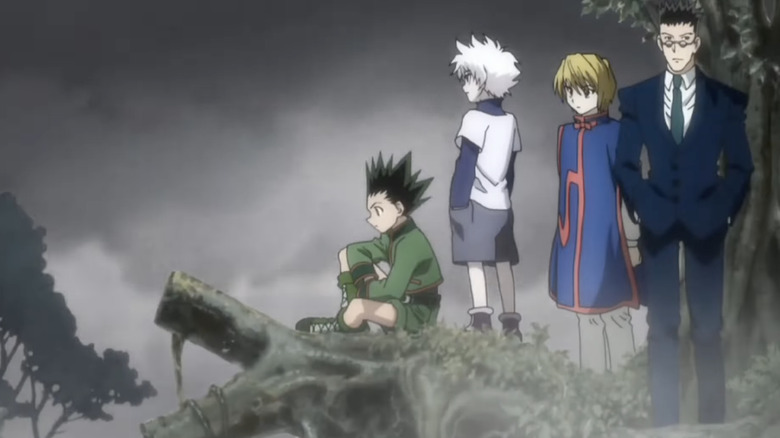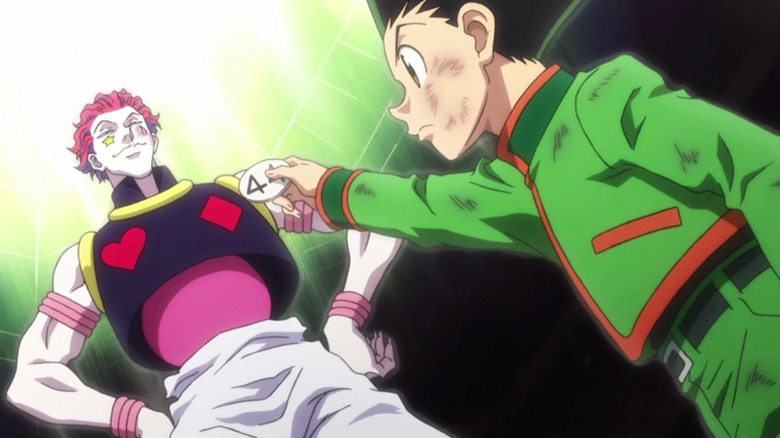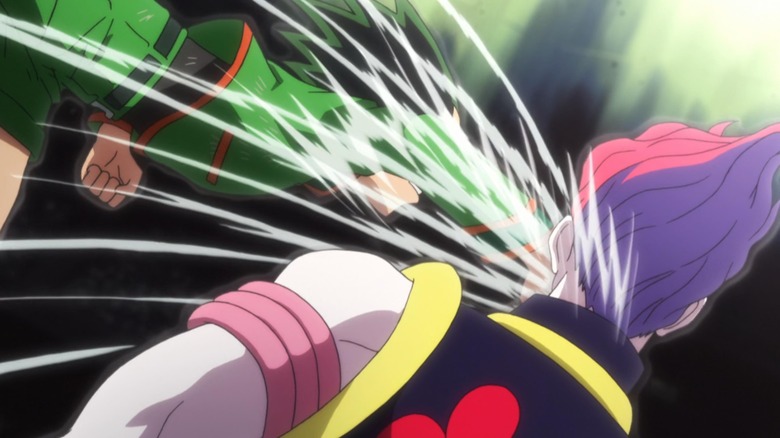This Hunter X Hunter Fight Has The Same DNA As Creed III
The climax of "Creed III" brings a whole new visual language to the series. As Adonis (Michael B. Jordan) and Damian Anderson (Jonathan Majors) box for the title of world champion, we enter their shared headspace. The crowd disappears and the sounds of their cheering drop out, leaving just the two former friends to confront each other. The imagery becomes surreal: the borders of the ring become prison bars, reflecting Damian's bitterness about how much of his life was wasted in a cell. Throughout the fight, whenever one boxer lands a blow, the scene goes into slow motion emphasizing specific strikes.
The influence for this type of filmmaking is anime action scenes. Jordan, the star of this franchise and now its director too, is the king of the weebs. In an interview with Polygon, Jordan cited his favorite anime, "Naruto Shippuden," as the primary inspiration for the climax of "Creed III." After all, Damian is basically the Sasuke to Adonis' Naruto. Jordan explained:
"It wasn't about anyone else watching the fight. It was about these two dudes who couldn't emotionally say what they had to say with their words, so they had to physically get it out through fighting. So that idea evolved into revisiting their childhood trauma and making it more like performance art, even."
Jordan's anime influence doesn't end with "Naruto," though. In an interview with the BBC, Jordan lists "Dragon Ball," "One Piece," "Bleach," and "Hunter x Hunter" as his favorites. The latter series in particular has the kind of action that Jordan has effusively praised on the "Creed" press circuit. "Hunter x Hunter" episode 35, where the young hero Gon Freecss faces off with the villainous magician Hisoka Morow before a crowd of spectators, uses the same visual language that makes "Creed III" so innovative.
Hunter x Hunter explained
"Hunter x Hunter" began as a manga, created by Yoshihiro Togashi and serialized in Weekly Shonen Jump magazine. Published since 1998 (albeit with plenty of hiatuses due to Togashi's health), it's one of the longest currently running "Jump" series by publication date (second only to "One Piece"). "Hunter x Hunter" has been adapted to anime twice, though the 1999 iteration has fallen into obscurity since the release of the longer 2011 remake.
This wild adventure begins when Gon discovers his father Ging, who he never knew, is part of the Hunters Association, a guild of professional adventurers. To meet his father, Gon decides to become a Hunter too. While taking the Hunter exam, Gon befriends other applicants Killua Zoldyck (the scion of legendary assassins), Leorio Paradinight (a penny-pinching medical student) and Kurapika Kurta (who is out to avenge the murder of his family and recover their stolen Scarlet-colored eyes).
Gon also runs afoul of Hisoka. Mr. Morow wears make-up and wields razor-sharp throwing cards that would make the Joker blush, but his clown-like appearance hides a sadist; he wants a Hunter license to kill without consequence. During the fourth challenge of the exam, the applicants have to steal each others' numbered badges — Gon is assigned to steal Hisoka's. He falls into a trap along the way, but Hisoka lets him keep the badge, preferring to spare Gon until he matures into a better fighter. When Gon tries to fight Hisoka anyway, the magician knocks him out with one punch. The ever-stubborn Gon decides he can't rest until he can punch Hisoka back with the same strength.
Heaven's Arena
In the second arc of "Hunter x Hunter" (Chapters 44 to 63 and episodes 27 to 38), Gon and Killua decide they need to both hone their fighting skills and make quick money. So, they head to Heaven's Arena, a 250-story skyscraper that hosts a fight club. Whenever someone wins a fight at the arena, they can move up a floor. The challenges get harder the higher you go, and if someone loses a certain number of matches they have to go back down. Gon and Killua soon learn that Hisoka is at Heaven's Arena too and Gon becomes set on a rematch.
Battle shōnen often follows these sorts of "Tournament arcs," including Togashi's earlier manga "YuYu Hakusho." The whole point of these series is to stage creative fights, so abandoning all pretense makes it easier on the writer. However, Togashi keeps the stay at "Heaven's Arena" thankfully brief — many of the actual fights are glossed over with montages. Instead, the focus is on character, from Gon and Killua bonding to honing their abilities with Nen (the magic system of "Hunter x Hunter," where users can manipulate their aura in countless ways). Once Gon has the basics of Nen down, he finally confronts Hisoka on the 200th floor of Heaven's Arena.
Now Gon and Hisoka's dynamic is much different than Adonis and Damian's. They were never friends, for one, and Hisoka's fixation on Gon is predatory, not vengeful. However, like in "Creed III," the fight feels like a climax to a shared history, and the two opponents communicate their desires with their fists. A crowd may be watching them, but Gon and Hisoka are focused only on each other.
Predator and prey in the ring
Gon opens the fight with an acrobatic flurry of mid-air kicks and punches — he has to compensate for his much shorter height — but Hisoka blocks and dodges them all without moving a step. Gon's attacks occur in a single take, with cuts only coming when one of Hisoka's strikes makes contact. Despite there being much more movement than in a boxing match, this draws attention to the stream of punches the same way.
Gon resorts to some trickery, lifting a stone floor tile and shattering it in Hisoka's direction. He hides behind the largest piece and dives towards Hisoka, finally landing the punch on his face. The punch is played three times, each from a different angle, the last showing Hisoka falling straight toward the screen. Once the scene cuts away to a wide shot of the fighters resuming their stances, the sound evaporates, only returning once Gon and Hisoka have made eye contact. Both the audio and visuals are focused on them first and foremost — the rest of the room might as well not exist.
Gon throws the badge back at Hisoka, but from there, the match goes in the magician's favor. With his "Bungee Gum" Nen ability, Hisoka throws Gon around like a doll and ultimately knocks him out with a rock to the face. Despite defeating Gon, Hisoka is convinced more than ever that the boy will one day be a worthy opponent. This outcome is reminiscent of "Rocky," the parent franchise of "Creed" — Gon lost the match, but he achieved a personal victory all the same.



